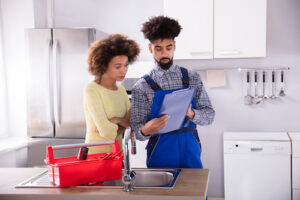
1. Understand how to turn off the water main in the event of an emergency leak.
Water can cause extensive damage to a home in a short period of time.
Plumbing leaks occur in every home; be prepared to turn off the water if you discover one. The water main is usually located near where the pipe enters the house. A shut-off valve in the pipe is usually turned off by turning it 90 degrees away from the pipe.
Turning the valve inline with the pipe turns it on; turning it at a 90-degree angle turns it off.
2. Locate the shut-off valves for each faucet and toilet.
Test them every couple of months to ensure they properly open, close, and shut off the water.
3. Keep an eye on your water pressure.
High water pressure can cause pipe and appliance damage and catastrophic water leaks.
You should already have a water pressure regulator where your water main meets the house, near your main shut-off valve. Water pressure should be between 40 and 70 psi. A water pressure of 80 psi or higher is considered unsafe.
When you turn on the water, high pressure can cause warning signs such as hammering sounds in the pipes.
4. Maintain the flow of your drains.
Other than human waste and toilet paper, never put anything down the drain.
5. Never put food down the garbage disposal.
Food can accumulate deep in your sewer pipe, causing major blockages. Garbage disposals are used to grind up small amounts of food debris. Place the remainder in the garbage can.
Grease, oils, and fats should never be poured down the drain. These will almost certainly cause clogs and cost you money to fix.
Never flush baby wipes, paper towels, or anything else that could cause expensive clogs.
6. Check for leaks regularly.
Examine the toilets, showerheads, faucets, washing machines, and outside hose bibs.
Check under sinks for any slow leaks that may be causing damage to your cabinets.
7. Repair leaking faucets and toilets.
These can waste a lot of water and eventually burst into larger leaks when you’re not home.
8. Have your plumbing inspected once a year.
Your water and sewer lines and all shut-off valves and faucets should be inspected once a year.
9. Flush your water heater tank once a year.
Remove hard water sediment to help the appliance last longer.
If it is more than 15 years old, consider replacing it to avoid potential leaks and floods.
10. Keep pipes from freezing in cold weather.
Wrap exposed pipes in outdoor pipe insulation if they are outside. In the winter, disconnect garden hoses and turn off the water valve.
Turn off your sprinkler systems for the season. Drain the water lines if you have a drip system.
11. Protect your home from potential flood damage while you are away.
Install a water flow security system, such as the Moen Flo, which automatically turns off the water main when it detects a leak.
These systems also allow you to control the water from your smartphone.
12. Stay away from odors.
Pour a pitcher or bucket of water down drains that are rarely used. This keeps water in the P-trap and keeps foul odors out of your home.
13. Keep hair away from drains.
To prevent hair clogs in your drain, cover the bath and shower drain with a hair catcher strainer.
14. Keep trees away from water and sewer lines.
Tree roots are the most common cause of broken water mains and sewer lines. These are potentially costly repairs that can be avoided by removing or avoiding planting trees near power lines.
15. Test and inspect your sprinkler systems regularly.
Examine for leaks or excessively long watering times, which can waste water and increase water costs.
16. Purchase a high-quality plunger.
Keep it on hand to clear minor clogs in toilets and sink drains.
17. Check the plumbing before purchasing a home.
Always have a water and sewer line inspection while in escrow and BEFORE you close the deal when purchasing a home.
Otherwise, you risk purchasing a home that requires extensive water or sewer line repairs, which could cost thousands of dollars.
A typical “home inspection” will not include a plumbing test. To properly test a home’s plumbing systems, you must hire a licensed plumber.
Call Top Tier Plumbing and Rooter Today!
If you need help with a plumbing issue in your home and can’t take care of it yourself, call (951) 475-6521 and speak to one of our expert plumbers today.

